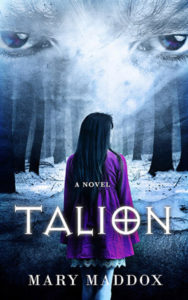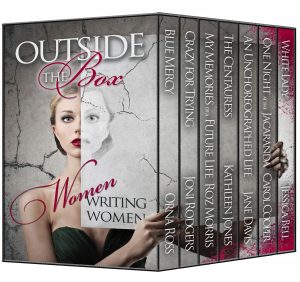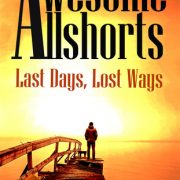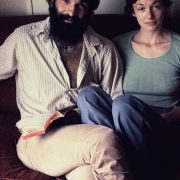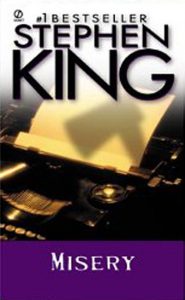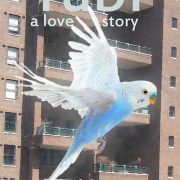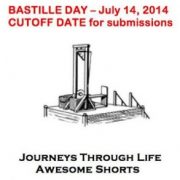The second chapter of Talion includes a flashback of Lisa and her brother visiting their father in Chicago. She receives a locket that becomes significant later. For readers wanting an entirely plot-driven story, the flashback might be an annoyance, but unless they understand who Lisa is, how will they care what happens to her?
Flying Spiders
He was nowhere in the crowd of faces at the airport gate. The other passengers swept her and Randy forward like a powerful river. A crash of voices and distant music echoed from the cavernous airport walls. Lisa searched the endless stream of faces. She desperately had to pee. They passed restrooms, but she couldn’t ask Randy to stop. He grabbed her wrist so hard she yelped in pain. “Stay with me!”
He dragged her through a huge terminal building to the United Airlines counter. They waited in a long line. When their turn finally came, the uniformed woman behind the counter was writing something. Randy drummed his fingers until she said, “May I help you?” Her eyelids drooped as she listened to him, then she lifted a phone and punched some buttons. “I got two kids here’s supposed to meet their daddy.” She pronounced the name, Murray Duncan, so precisely that it sounded like contempt. She hung up and started checking suitcases as if Randy and Lisa weren’t there anymore. Another uniformed woman told them to step aside so the line could keep moving. Squeezed between the ticket line and the baggage line, they got jostled and drew curious stares.
Randy’s face turned red and knotty, like when he lifted his stupid barbells. What if he started a fight and ruined their vacation?
“Dad probably just went to the wrong place,” Lisa said.
“Well, they’re paging him right now.”
A loudspeaker drifted above the noise in the terminal: Murray Duncan, please come to the United Airlines ticket counter. Murray Duncan . . . Something about the sound, hollow and distorted, made Lisa feel the awful moment would keep happening forever. Dad would always forget to meet them, and his name would drift through the airport terminal like a ghost.
Lisa saw the girl coming. She hurried along in snake-skin pumps with ticking steps that made her boobs jiggle. Lisa might have laughed except the girl was gorgeous. She looked like a model with perfect hair and makeup and a flashbulb smile.
“You’re Randy, right? You’ve got your dad’s sexy eyes.”
The swollen anger drained from his face like air from a popped balloon. The girl tossed a conspiring smile over her shoulder. That’s how you handle men, it said. She introduced herself as Angelina and apologized for not meeting them at the gate. The traffic on the expressway had been insane.
Randy carried their suitcases out to the car and stowed them in the trunk, putting lots of effort into lifting so Angelina could see his biceps. Lisa snickered but kept her mouth shut. She wanted his good mood to hold. Breathing the grit and fumes of the airport, she felt excited and a little queasy. Her whole life would change from this vacation, she just knew. It didn’t even matter that Randy took the front seat and stuck her with sitting in back.
“Where’s our dad?” Randy asked once they were on the expressway.
“In a meeting.”
They waited for Angelina to explain further as hundreds of cars spun past, the people inside glowering or desperate or laughing wildly. Compared to them she seemed cool and perfect. Her hands rested easily on the steering wheel, the car just another accessory like her gold bracelet and pink nails.
“Are you his girlfriend?”
“Yes. And I work for him as well. I’ll be staying with you while he’s at the office.”
“So he’s paying you to stay with us?”
“Should he be?”
Randy scowled. Though he teased Lisa without mercy, he hated being teased himself.
The condo, in a high-rise by the lake, was like a picture in a magazine. Everything down to the empty flower vase fit the decorating scheme, but nothing reminded Lisa of Dad. It felt like a hotel. She and Randy watched TV and drank bottle after bottle of orange and lemon Pellegrino.
She felt bloated and grouchy by the time Angelina drove them to a restaurant with pastel tablecloths and napkins spread like fans. Dad sat alone at a table drinking a foreign beer and reading a newspaper. He looked different than she remembered. Didn’t he used to have a tan? Now his skin reminded her of mushrooms. It was stretched too tight over his cheekbones, but under his eyes the wrinkles gathered like cobwebs.
Then he hugged her and said, “How’s my beautiful girl,” and Lisa told herself everything would be OK.
The next day Angelina took them shopping. In a jewelry store Lisa found the locket. She knew right away it was what she wanted — a smooth hunk of 14-carat gold with a thick chain. Inside, Dad’s picture would fit beneath a crystal. Angelina slapped down a credit card without asking the price.
That evening they had dinner at an Italian restaurant too fancy to serve pizza, and Lisa asked Dad for a picture of himself.
“You don’t need my picture.”
Lisa was too surprised to answer.
“Can’t you give a picture to your own daughter?” Angelina said, careful not to presume. She was just asking.
“I don’t have one.”
“I’ll take one,” Randy said.
“No. If there has to be a photograph, I’ll get it done professionally.”
At the end of their visit, he’d given each of them a photograph that looked like it came from his driver’s license.
On the plane home Randy said, “What an asshole. He’s paranoid of his own kids.”
“What do you mean?”
“He doesn’t want pictures of himself floating around for the cops to get a hold of. He scams people. He talks them into phony investments and steals their money.”
“He does not.” Lisa yelled so loud the flight attendant frowned a warning at her.
“Ask Mom if you don’t believe me.”
“Mom hates him.”
“Because he’s an asshole. He spent more time with Angelina than us.”
On a bright Sunday afternoon, Dad and Angelina had taken them to the John Hancock Center. They rode an elevator at breakneck speed to the observatory on top. It was swarming with tourists. Everyone jockeyed for a spot at the windows. Luckily Randy was big enough to elbow past the adults, and Lisa was small enough to stand in front of him without blocking his view.
Sailboats drifted across the lake in dreamlike silence. Lisa imagined sailing out there, the sun on her shoulders, the waves lifting her with the promise of excitement. She imagined diving into the jeweled water of the pool on the roof of an apartment tower. Knowing her father lived in just such a building, she felt like a princess. When she was older and ready, he would bring her into his world. She would dedicate herself to preparing for that time.
She realized Dad and Angelina were gone. They had to be somewhere in the observatory, but she felt anxious. She turned to Randy. He was staring, not at the lake or buildings but into the vacant sky.
“What’s up there?”
“Spiders. On the outside of the window.” He pointed to some darkish specks Lisa had dismissed as dirt. But they were spiders. “I wonder how they get up here. And what do they eat? Probably insects that come flying along. And if the wind blows them off, they’re so light they float along on air currents to another skyscraper.”
“You can see spiders anywhere,” she said. “Where’s Dad?”
“Who cares.” His eyes never left the spiders. “You go find them.”
The observatory’s corridor followed the outer windows to form a big square. On the opposite side she found Dad and Angelina. They were each leaning a shoulder against the inner wall, touching foreheads as if sharing secrets through telepathy. His arms circled her waist. Lisa knew then he wanted to be with Angelina. His kids coming to visit was a pain, and he could hardly wait for them to leave.
They never heard from him anymore. The child-support checks were signed by his lawyer. The birthday and Christmas presents were certificates from upscale catalogs, but Mom still made them send thank-you notes. “Your actions show who you are,” she said. “And if he’s got any shame he’ll help pay for your college.”


